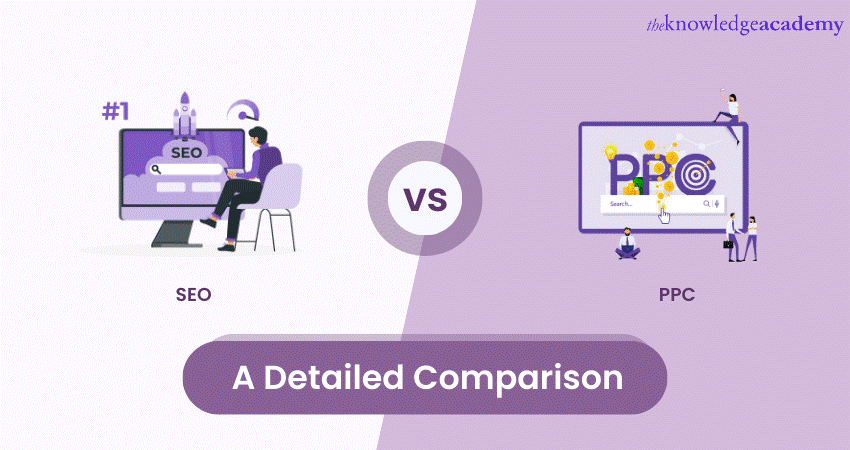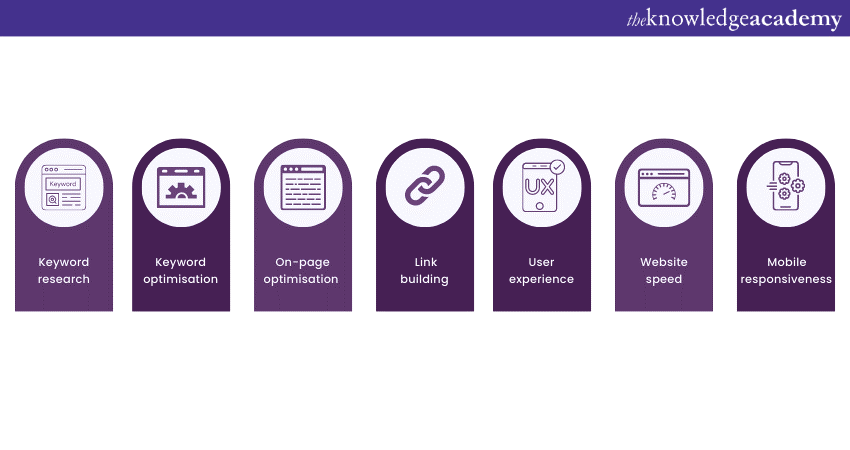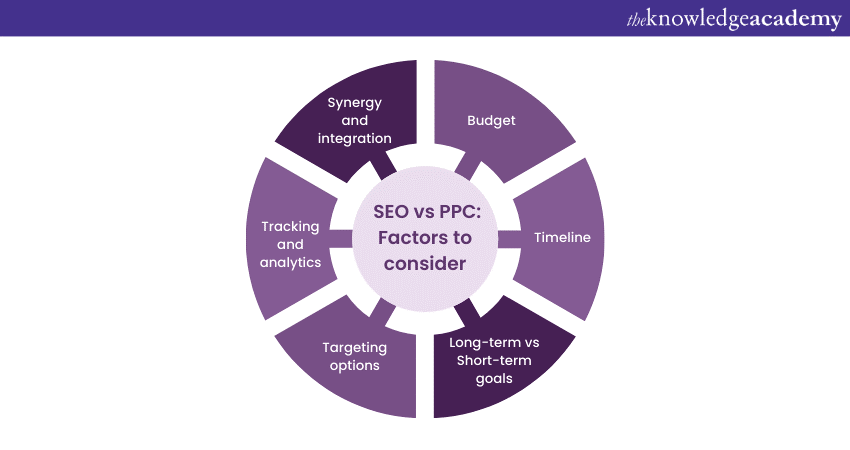We may not have the course you’re looking for. If you enquire or give us a call on 01344203999 and speak to our training experts, we may still be able to help with your training requirements.
Training Outcomes Within Your Budget!
We ensure quality, budget-alignment, and timely delivery by our expert instructors.

As businesses seek to improve their website’s ranking and drive targeted traffic, the enormous choices available can be increasingly overwhelming. SEO and PPC are two strategies that stand out. However, organisations wrestle to choose SEO vs PPC pertaining to online visibility and traffic.
Search Engine Optimisation or SEO is a mechanism of optimising websites and content to rank higher in Search Engine Results organically. At the same time, Pay Per Click involves paid advertising, where businesses pay for each click on their ads. The question is, which strategy should you focus on? It’s important to understand the nuances and benefits of each approach to make an informed decision.
Then how do you choose the right strategy? Worry no more. Read this blog to learn about SEO vs PPC with a detailed comparison. By the end, you will know which one is better and how to choose accordingly.
Table of Contents
1) What is SEO?
2) Overview of PPC
3) Key differences between SEO and PPC
4) SEO vs PPC: Which one to choose?
5) Conclusion
What is SEO?
SEO is an acronym for Search Engine Optimisation which is a fundamental aspect of digital marketing that focuses on improving the website’s visibility and ranking in Search Engine Results Pages (SERPs). It involves implementing various strategies and techniques to enhance the website’s relevance and authority in the eyes of search engines.
SEO aims to optimise the website’s structure, content, and other elements to align with the algorithms used by Google, Bing, and Yahoo. By doing so, SEO aims to increase the website’s organic (non-paid) traffic by appearing higher in the search results for relevant queries.
It encompasses numerous factors that contribute to a website’s ranking. These include the following:

The ultimate objective is to create a user-friendly website that provides valuable and relevant information to visitors. It is an ongoing process requiring continuous monitoring, analysis, and adjustment to stay in line with the evolving search engine algorithms and changing user behaviours.
As a result, businesses can improve their online visibility, attract targeted organic traffic, and ultimately achieve their marketing objectives.
Enhance your understanding of SEO and gain practical knowledge with our SEO Masterclass!
Overview of PPC
PPC, which stands for Pay-Per-Click, is a digital advertising model. Here, advertisers must pay a fee each time their ad is clicked. It is a form of online advertising that aims to drive the target traffic to a website or landing page.
Unlike organic Search Results, achieved through SEO efforts, it allows advertisers to place ads directly on search engine result pages (SERPs), social media platforms, or other websites. Advertisers bid on specific keywords or target audience demographics, and their ads are displayed to users who enter relevant search queries or meet the specified criteria.
The core principle of this strategy is that advertisers have to pay only when someone clicks on their ad, hence the name “Pay-Per-Click.” The Cost Per Click (CPC) varies depending on keyword competitiveness, ad quality, and bidding strategies. Advertisers can set a maximum campaign budget to control their overall spending.
Furthermore, advertising platforms, such as Google Ads and social media advertising platforms, offer robust tools and features to help advertisers optimise their campaigns. These tools allow for A/B testing of ad variations, bid management, and performance analysis, enabling advertisers to refine their strategies and improve their campaign performance over time.
Take your digital marketing skills to the next level with our comprehensive Pay Per Click (PPC) Masterclass!
Key differences between SEO and PPC
In online marketing, Search Engine Optimisation and Pay-Per-Click are two strategies businesses can employ to improve online visibility and attract targeted traffic. Understanding the key differences between SEO vs PPC is essential for choosing the right approach for your Digital Marketing efforts. Let’s explore these differences in detail:
|
Key Differences |
SEO |
PPC |
|
Nature of traffic |
Organic search results |
Paid traffic |
|
Cost structure |
Long-term investment with lower ongoing costs |
Direct costs per click |
|
Timeline and results |
Long-term strategy with gradual results |
Immediate visibility and quick results |
|
Targeting options |
Limited targeting options |
Granular targeting options |
|
Credibility and trust |
Builds credibility and trust over time |
Perceived credibility may be lower compared to organic results |
|
Longevity of results |
Potential for long-term visibility |
Temporary impact |
|
Competition and cost |
Highly competitive, cost-effective in the long run |
Directly competing for top positions can be costly |
|
Return on Investment (ROI) |
Takes time to see ROI |
Immediate results but temporary without ongoing investment |
1) Nature of traffic
One of the fundamental distinctions between SEO and PPC lies in the traffic they generate. SEO focuses on organic search results. It means the traffic comes from users who find your website through unpaid search engine listings.
On the other hand, PPC generates paid traffic, where businesses pay for each click on their ads, and the ads are displayed prominently on search engine result pages (SERPs) or other platforms.
2) Cost structure
SEO and PPC differ in terms of their cost structure. SEO is generally a long-term investment that requires continuous effort and resources to optimise your website and improve its ranking in organic search results. While the initial costs of Search Engine Optimisation can vary depending on factors such as hiring specialists or investing in SEO tools, the ongoing costs are typically lower than PPC.
It involves direct costs as businesses pay for each click on their ads. The cost per click (CPC) can vary depending on keyword competitiveness, bidding strategies, and quality score.
3) Timeline and results
SEO vs PPC also differ in terms of the timeline and the results they deliver. SEO is a long-term strategy needing time to build momentum and see significant results. Search engines crawl and index your website, evaluate its relevance and improve its ranking.
On the contrary, PPC offers immediate visibility and can drive traffic to your website as soon as the campaign is launched. It can provide quick results, making it suitable for businesses with short-term objectives or specific promotions.
4) Targeting options
Another significant difference between PPC and SEO lies in their targeting options. SEO relies on optimising your website and content to rank higher with organic search results for relevant queries. While you can optimise your website for specific keywords, it does not provide the same level of granular targeting as PPC.
Pay Per Click allows businesses to target specific demographics, locations, interests, and even specific websites where they want their ads to be displayed. This level of targeting precision can be valuable for businesses that wish to reach a specific audience or run highly tailored campaigns.

5) Credibility and trust
SEO can contribute to building credibility and trust for your website. Users who locate your website organically through search results often perceive it as more reliable and trustworthy than paid ads. It establishes your website’s authority and credibility over time, increasing users’ trust.
Although effective in generating immediate visibility, PPC may not have the same level of perceived credibility as organic search results.
6) Longevity of results
SEO offers the potential for long-term visibility and results. Once your website achieves higher organic rankings, it can continue to engage traffic and generate leads even without ongoing investment. However, maintaining your efforts and staying updated with search engine algorithms is crucial to sustain and improve your rankings.
On the other hand, PPC provides immediate visibility and results, but its impact is temporary. Once you stop investing in its campaigns, your ads will no longer be displayed, and the traffic will cease.
7) Competition and cost
SEO vs PPC differ in terms of competition and cost-effectiveness. SEO can be highly competitive, especially for popular keywords and industries, requiring continuous effort to outrank competitors. While it can provide cost-effective long-term results, seeing a return on investment may take time.
PPC, on the other hand, allows you to compete directly for top positions on search engine result pages, regardless of the level of competition. However, it can be costly, especially for highly competitive keywords, and businesses need to manage their budgets and bidding strategies carefully.
SEO vs PPC offer distinct approaches to improving online visibility and driving targeted traffic. Choosing PPC and SEO depends on your business objectives, budget, timeline, and targeting requirements. In many cases, combining both strategies can yield the best results, allowing you to leverage the strengths of each approach to maximise your online marketing efforts.
SEO vs PPC: Which one to choose?
When it comes to choosing between Search Engine Optimisation and Pay-Per-Click, it's important to consider specific factors in choosing the one for you. Both have their own advantages and can complement each other in a comprehensive digital marketing strategy. Let's explore the factors that can help you make an informed decision:

Budget
SEO is generally a long-term investment with lower ongoing costs, making it a more cost-effective option in the long run. However, it requires patience and continuous effort to see significant results. On the other hand, PPC involves direct costs, as you pay for each click on your ads. It offers immediate visibility and can generate quick results but can be costly, especially for competitive keywords. Evaluate your budget and determine which approach aligns better with your financial resources.
Immediacy of results
PPC is a suitable option if you’re looking for immediate visibility and quick results. With PPC, you can launch campaigns and instantly drive targeted traffic to your website. Conversely, SEO takes consistent effort and patience to achieve higher organic rankings. Consider whether you have the time to invest in SEO or need immediate results with PPC.
Goals
SEO can generate consistent organic traffic, even with reduced efforts in the future. Conversely, PPC is more suitable for short-term goals, specific promotions, or seasonal campaigns. It provides immediate visibility and quick results, but its impact isn’t the last longing if no ongoing investment exists.
Organisation’s keyword target
To optimise your website, SEO provides specific keywords, improving your visibility in organic search results. While it provides some level of targeting based on keywords, PPC offers more granular targeting options. If precise audience targeting is crucial for your marketing strategy, PPC may be preferred.
Tracking and analytics
SEO and PPC provide data and insights to measure the effectiveness of your campaigns. SEO allows you to track organic traffic, keyword rankings, and user engagement metrics. PPC Tools are used to monitor clicks, impressions, conversions, and other valuable metrics. Consider which type of data is more important for your decision-making and optimisation processes.
Synergy and integration
Combining both strategies can provide a comprehensive digital marketing approach. SEO helps build long-term visibility and credibility, while PPC offers immediate visibility and targeted traffic. Using PPC to complement your SEO efforts can boost your overall online presence and maximise your reach.
Conclusion
SEO vs PPC – which one to choose? The decision should be based on a thorough evaluation of your specific needs and a strategic understanding of the benefits and limitations of each approach in order to achieve optimal results in the dynamic landscape of online marketing.
Enhance your career and stay ahead in the competitive digital landscape with our Digital Marketing Courses.
Frequently Asked Questions
Upcoming Digital Marketing Resources Batches & Dates
Date
 Pay Per Click (PPC) Training
Pay Per Click (PPC) Training
Fri 21st Jun 2024
Fri 16th Aug 2024
Fri 18th Oct 2024
Fri 20th Dec 2024







 Top Rated Course
Top Rated Course


 If you wish to make any changes to your course, please
If you wish to make any changes to your course, please


